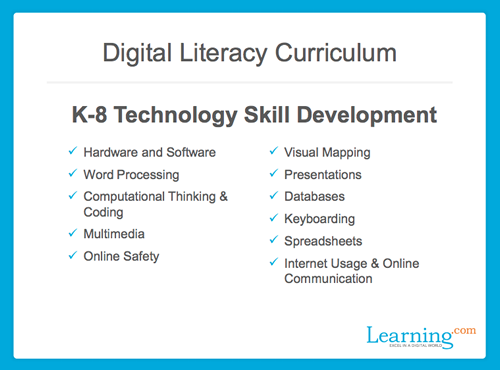Online assessments are becoming more common, and students who have strong digital literacy skills often score higher on them. Students who lack these skills may not be able to effectively demonstrate mastery of key concepts in math, reading, or writing on online assessments. Technology and digital literacy specialists at Flagstaff Unified School District (USD) in Arizona reviewed the importance of teaching digital literacy skills and how their district is doing so in “Improving Student Performance on Online Assessments.”
Although digital literacy had been a conversation within Flagstaff USD for some time, there were varying degrees with which teachers at different schools addressed the skills. Still, the application of the skills to demonstrate knowledge was a clear need with the use of online assessments. The district came to a consensus on the definition of digital literacy skills, what kinds of common core standards included them, and how they were already being taught. School and district leadership involvement was a critical factor in developing an effective district-wide approach moving forward.
Online assessments offer advantages over paper-and-pencil tests, such as faster student feedback, improved accessibility features, and the ability to better assess student knowledge. The tasks students are asked to perform help teachers better understand where they need to shift their instructional practice. Some key skills for online-assessment success include word processing and keyboarding, highlighting, graph understanding, research skills, and using subject-specific tools.
(Next page: 3 ways to prepare students for online assessments)
3 ways to prepare students for online assessments
1. Embed specific skills into lessons. Teachers can work keyboarding into project-based learning or students can use tools like Google Docs to practice typing.
2. Teach students to use the same tools in multiple modalities. For example, ask students to use a physical and digital protractor to help scaffold their digital-literacy skills.
3. Make sure students are comfortable with their devices. Teacher can ensure that students get adequate practice on the devices they’ll use for their online assessments. They can also let students take practice assessments using the devices.
After observing what other districts were doing and determining what would best meet their own needs, Flagstaff USD implemented a digital literacy curriculum to help develop these skills. The curriculum prioritized factors like an easy-to-implement framework for teachers, a tool that could help offset limited staff resources, and something that aligned to their state technology standards. They also used a technology skills assessment to measure digital literacies and determine how to move forward with skill development.
Flagstaff USD uses a variety of resources to accomplish digital literacy growth. The technology department works closely with the curriculum and instruction department, creating a strong partnership. The district also has a technology peer coaching program that allows teachers to receive additional professional development to support other teachers in developing their skills and assisting their students. Technology proficiency is even included on their teacher-evaluation rubric. By determining district priorities, assessing needs, and working together, teachers can help students develop critical skills needed for online assessments and in life.
About the Presenters
Mary Knight has been an educator with the Flagstaff USD for more than 25 years. As the director of technology, she oversees the student information system, infrastructure, and instructional technology services. She believes that having a healthy and well-functioning technology environment is critical in providing effective educational and administrative resources to district students, staff, and community.
Heather Breedlove is the technology integration coordinator for the Flagstaff USD and received the AzTEA Educational Technology Specialist of the Year award in 2015. Breedlove develops, facilitates, and coordinates professional development opportunities in technology integration for teachers, staff, and administration. She is passionate about innovative teaching practices and provides a variety of experiences for teachers to learn about technology that can transform their teaching and classrooms.
As digital literacy specialist, Heather Zeigler assists students in developing the digital literacy skills critical for their future. She accomplishes this by supporting students, teachers, administrators, and staff through professional development and peer coach program advancement and facilitation focused on technology integration. A prior elementary classroom teacher, Zeigler guides staff in their role as facilitators of learning by planning technology-rich projects and encouraging practices of integrating technology into education in a positive manner that promotes a more diverse, rigorous, and personalized learning environment for the digital learners in our schools today.
Join the Community
Success in a Digital World is a free professional learning community that will help you prepare your students with the skills they need to excel in our digital world.
This broadcast was hosted by edWeb.net and sponsored by Learning.com.
The recording of the edWebinar can be viewed by anyone here.
[Editor’s note: This piece is original content produced by edWeb.net. View more edWeb.net events here.]
- 3 ways to avoid summer learning loss - April 19, 2024
- High school students say AI will change the workforce - April 18, 2024
- Motivating students using the Self-Determination Theory - April 17, 2024


